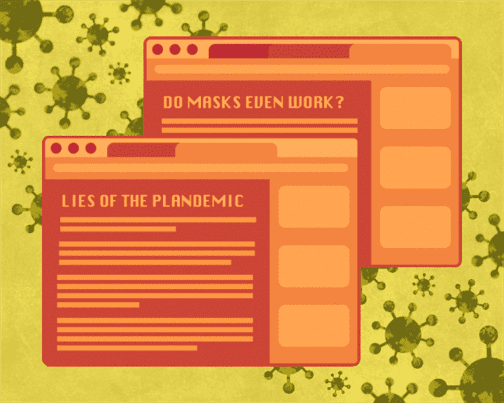As a resurgence of the coronavirus (COVID-19) pandemic seizes the nation and threatens reopening procedures, health officials and researchers are fighting a battle against the persistent misinformation surrounding the new coronavirus. Misinformation could affect how long the pandemic drags on for, as well as how Montclair State University chooses to run its semesters, potentially impacting the health, safety and educational experience of Montclair State students.
Professor Eric Forgoston, Montclair State’s chairperson of applied mathematics and statistics, who conducted research earlier this year on the spread of COVID-19, has been following the spread of this misinformation.
“Some of the misinformation has been disseminated by publicly elected officials and includes trivializing COVID-19 and its risk to the population, stating that control measures, such as mask wearing, that are known to be effective are not, contradicting statements made by their own public health experts and speaking against vaccine development,” Forgoston said.
Forgoston’s research involved constructing a model of disease spread that accounts for variables like age and social contact, as well as control strategies like wearing masks, social distancing and lockdowns. This research was done in collaboration with Michael Thorne, a computational biologist at British Antarctic Survey.
“Applied to the specific circumstances of New Jersey, the model demonstrates that only a rigorous program of testing, contact tracing and isolation of cases will allow the state to safely ease its lockdown,” Forgoston said.
New Jersey, which has seen more than 320,000 COVID-19 cases and more than 16,000 deaths due to the new coronavirus, is now immersed in a new wave of cases. As the holiday season swiftly approaches, New Jersey reels from record numbers of new cases reported in a single day, reaching 4,500 on Nov. 15 according to an announcement from Gov. Phil Murphy, and thousands more since then.
Social media, where anti-mask and anti-social distancing sentiments have found prolonged existence, has been identified as a potential contributing factor to the pandemic. A pair of videos entitled “Plandemic,” by conspiracist Mikki Willis, claim the pandemic was constructed in order for pharmaceutical and healthcare organizations to profit. The videos were found by PolitiFact to contain numerous instances of false information and make unsupported claims about the new coronavirus.
“Social media, which is largely unregulated, can also contribute to a massive amplification of misinformation. There is some concern that misinformation about the virus, how it spreads and how to contain it, is contributing adversely to the ongoing pandemic. This concern is large enough that it has prompted the World Health Organization (WHO) to warn of an ongoing ‘infodemic,’” Forgoston said.
The infodemic, as defined by the WHO, refers to “an overabundance of information [that] includes deliberate attempts to disseminate wrong information to undermine the public health response and advance alternative agendas of groups or individuals.”
The infodemic is in part founded on a lack of trust or understanding of science. Science has an internal filtration process, known as the peer review process, that exists to catch data manipulation and inaccurate conclusions. One example is known as “p-hacking,” a term that refers to the manipulation of p-values, which can signal how likely or unlikely it is that two variables are related.
“Data dredging or p-hacking involves the abuse of data analytic techniques in order to find patterns in data. One way this abuse occurs is through the application of many statistical tests on the data. Instead of reporting all results, one reports only on those results that are favorable,” Forgoston said.
Data dredging can lead to unsubstantiated headlines like “coffee causes cancer” or “eating chocolate makes you live longer,” but it can also have more serious implications. One of the most infamous examples of malicious data dredging is the 1998 Lancet measles, mumps and rubella (MMR) autism fraud.
The Lancet, a peer-reviewed medical journal, featured a publication claiming that a link existed between the MMR vaccine and autism spectrum disorders. Authored by Andrew Wakefield, the paper has since been found to be fraudulent and has been retracted by The Lancet. Wakefield, a former surgeon, has since been discredited and barred from practicing medicine in the United Kingdom.
Such claims, however, can cause lasting damage long after they have been discredited. Wakefield’s paper is notorious for helping spur the anti-vaccine movement, a movement that persists today in the U.S. Such movements can affect how people vote, persuade parents to not vaccinate their children and ultimately undermine the public’s perception of the scientific process.

Professor Eric Forgoston, Montclair State University’s chairperson of applied mathematics and statistics, has conducted research on the coronavirus (COVID-19) pandemic.
Photo courtesy of Eric Forgoston
According to Forgoston, however, the deliberate misinterpretation of data is rare and will eventually be discovered and corrected.
“Although p-hacking can be done purposefully and maliciously, for the most part it is not. Rather, science is complicated with many degrees of freedom that require scientists to make choices. Human bias, much of which is unconscious, can lead individuals to manipulating these choices with the result being a different p-value,” Forgoston said.
Using tests for correlation alone, variables that are otherwise unrelated can appear as though they are related. Spurious Correlations, a website created by former military analyst Tyler Vigen, showcases such relationships with examples like the correlation between the number of films Nicholas Cage appeared in each year and the number of people who drowned by falling into a pool.
The reliance on the p-value alone and the potential for biased interpretations has led the statistical community to push for higher standards when drawing conclusions from data.
“It is well-known that the p-value from a statistical study does not work very well when trying to understand the strength of evidence. For this reason, statistical societies and research journals have made a recent push to convince researchers to use a variety of strong descriptive statistics and not to rely so much on the p-value,” Forgoston said. “Some journals will no longer publish p-values. So while historically there may have been an over-reliance on the p-value, this is being corrected. Improved statistical standards will result in even better science.”
While science has safeguards against misinformation in its own ranks, the rest of society is still feeling the effects of viral misinformation outside the walls of the laboratory. Data floating around on the internet may be used to falsely demonstrate relationships between variables when, in reality, it does not. Posts or comments may also cite sources that are not reliable or lie outside of scientific circles.
As the infodemic rages on, fueled by skeptic and conspiracist rhetoric, the economy has been struggling to hold itself together. As a result, universities across the nation are feeling financial pressure to reopen as soon as possible.
“There has been a disconnect between the science of epidemiology and the actions of universities across the U.S. and world due to financial issues. Many times universities are opening at different levels, not because the science says it is OK, but because they are afraid if they don’t, they will lose students and the associated tuition, residence hall, dining and parking revenue. It is a real concern and the balance is difficult,” Forgoston said.
As part of its Red Hawk Restart initiative for the spring 2021 semester, Montclair State is aiming for 50% of classes having at least some in-person component, according to a statement given to NorthJersey.com by Andrew Mees, the senior media relations specialist at Montclair State. Of those classes, the minority would be fully in-person, with most being hybrid. This still means that half of all classes will remain entirely online for the spring semester.
Brandon Martinez, an applied mathematics graduate student, expressed his feelings amid the rising COVID-19 cases and the upcoming spring semester.
“My classes are all online for the spring term; I think it is the best way to contain the current pandemic and that it is absolutely necessary given the current surge in COVID-19 cases,” Martinez said. “But online learning will never be as effective as in-person instruction. Additionally, being on campus provides a healthier balance between learning and social interaction.”
As of Nov. 19, Montclair State has seen a reported total of 120 confirmed cases of COVID-19, with 5,042 students and employees having been tested under the university’s surveillance testing program. This data is posted online on Montclair State’s COVID-19 dashboard and is updated weekly.
The Restart initiative involves continued student and employee training, mask-wearing, proper vaccination, social distancing protocols, sanitization of facilities and hygiene supplies throughout campus.
These safety measures have become a familiar picture throughout many reopened locations, and in light of this pandemic, the world may find itself returning to a different kind of normal.
“Life will not return to normal until a large fraction of the population has been vaccinated, perhaps nine to 15 months from now. And even that normal will be a ‘new normal’ that likely involves the continuation of mask-wearing for an additional length of time,” Forgoston said.
In the meantime, experts and public officials urge the public to trust science. President-elect Joe Biden announced in his victory speech that his 2021 COVID-19 action plan will be “built on a bedrock of science.” The path to ending the pandemic will involve, at least in part, ending the infodemic, which starts with Americans arming themselves with data interpretation and reasoning skills.
Forgoston encourages everyone to take an active role in evaluating the information they read or hear.
“With the enormous amounts of available data in today’s world, it is essential that everyone develop data literacy,” Forgoston said. “Even taking just a couple of statistics courses will enable someone to engage with data, be able to visualize data and perform some basic analysis of the data. These skills will allow someone to distinguish valid results from misinformation and will enable someone to provide a reason and guidance for making a decision.”



